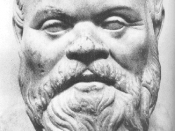Consequentialist theorists propose that our only duty should be to do whatever has the best consequences. Utilitarianism, the most popular of consequentialist theories, was formulated by Jeremy Bentham (1789) and later refined by John Stuart Mill (1861). In general terms, classical utilitarianism states that we should do whatever maximises the balance of pleasure over pain for everyone affected by our action. This is a modern conception of morality. It does not rely on God to provide us with moral rules, but places morality in human nature, in which human beings are primarily motivated by desire and passion, in a consistent effort to avoid pain and misery. People desire happiness, therefore happiness is good, and therefore general happiness is a social good. So, by calling an act good and right would actually mean it promoted the greatest happiness for the greatest number of people (or "maximising act consequentialism). This could possibly mean acting in a manner that ran contrary to traditional morality, for example, assassinating a ruthless dictator, personally responsible for torturing thousands of his own people.
We know it is morally wrong to kill another human being, but by doing so, it would save others from further anguish.
A more difficult argument would be if utilitarianism were to demand that you sacrificed your own pleasure for the greater pleasure of others. If you were to immediately donate the entire winnings from a lottery jackpot to fund the development of resources for under privileged children. The simplest objection to utilitarianism might therefore be, "why should I always act to increase the total happiness of the world", which would not be entirely unreasonable. A second objection might conclude that general happiness as a social aim does not prove that happiness itself is good, as people can desire many bad things. This follows...



Good philosophy
wow, i learned a lot about in this essay. thats really good about if self happiness is worth more or less than general happiness.
1 out of 2 people found this comment useful.